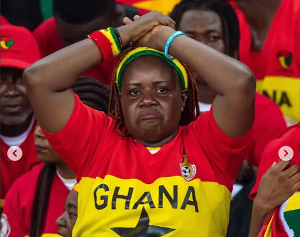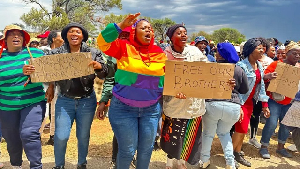Were there any Ghanaian collaborators?
On July 20, just before British Parliament rose, Austin Mitchell, the MP for Grimsby, unfolded a chilling tale in Westminster Hall, heard by only three other MPs, one of whom was in the chair. It concerned his old friend Howard Horsley, who won a sterling reputation during his 14 years of running a comprehensive school.
In 1999, looking for a new challenge, Mr Horsley was sent to Ghana to take charge of the biggest educational aid programme ever run by the Department for International Development (DFID).
When Mr Horsley arrived in June 1999, he was soon made aware that all was not well with this project. Both Ghanaian officials and senior staff of other international agencies, such as the World Bank, warned him of their concern at how DFID?s money was being spent. Financial controls seemed so lax as to be nonexistent. As Mr Mitchell tactfully phrased it, this ?could give rise to corruption in purchasing, for instance, Land Rovers and computers?, although the evidence went rather further. Mr Horsley reported to London in some detail, asking for a disciplinary investigation. He was confident that his frankness in communicating his concerns would be protected by the new Public Interest Disclosure Act, hailed as ?the whistleblower?s charter?.
A particular problem for Ghana at this time was the financial losses the country had suffered when Gordon Brown sold off a hefty chunk of Britain?s gold reserves to buy euros. This had resulted in a steep drop in the gold price, inflicting serious damage on the Ghanaian economy.
In September 1999, Mr Horsley was told at a meeting with senior officials of the Ghanaian government and the British High Commission that the UK Government had handed over ?18 million in compensation, and that this would be spent on education.
Before Mr Horsley saw the money, he contracted typhoid from his travels round the country and was flown back to Britain. After his recovery, December 1999 he planned to return to Ghana, calling in first at DFID for what he assumed to be a routine briefing. Four officials greeted him with the news that he had been sacked, for reasons they refused to disclose.
He could only assume they were connected with the allegations he had made against a senior DFID colleague. He told them he intended to appeal. He was given permission to return to Ghana to collect evidence, and was assured that his files would be ?protected?.
This was on a Thursday. When he arrived in Accra on Saturday, he found all the locks in his office had been changed. When he finally gained access to his office, he discovered that all the contents of his computer had been wiped, on the instructions of DFID in London, the day after his meeting.
From then on Mr Horsley found he had been plunged into a Kakfa world. He was told he must not speak to anyone about what had happened, on pain of prosecution under the Official Secrets Act. Sir John Vereker, the permanent head of DFID, promised an internal inquiry, with no apparent outcome.
He appealed to an employment tribunal, where he was still not told of the reasons for his dismissal and denied access to documents, despite the Treasury Solicitor?s assurance that all relevant documents had been declared. The tribunal refused to accept jurisdiction. Mr Horsley then, at considerable expense, sought a judicial review and was eventually turned down by the Court of Appeal.
By now at his wits? end, Mr Horsley turned for help to his friend Austin Mitchell, who then saw how the nightmare continued. As Mr Mitchell told Parliament, subsequent correspondence showed that Sir John Vereker had not instituted the promised inquiry. At a meeting with Lord Goldsmith, the Attorney-General admitted that the tribunal had been misled over the documents, but insisted that it was not up to the Treasury Solicitor to check whether DFID was telling the truth. The Ombudsman said he had no jurisdiction in employment matters.
The senior Civil Service Commissioner said she could do nothing because Mr Horsley was not technically a civil servant. The only senior official at all helpful was Sir John Bourn, head of the National Audit Office, who sent his officials to Ghana where they confirmed that DFID?s financial controls were indeed hopelessly lax, but could find no hard evidence for corruption. Nor could they find any trace of the ?18 million which Mr Horsley was told in September 1999 had already been handed over.
The final blow for Mr Horsley came when he was offered a senior post in educational administration on condition he was given a reference by his last employer. Without explanation DFID refused to give it. Mr Mitchell described their experience as being ?batted around like two shuttlecocks?, between public bodies all of which seemed determined simply to ?put up the shutters?. Mr Horsley, he said, had been treated in an ?abominable and disgraceful fashion?. Mr Mitchell has now written to Hilary Benn, DFID?s new Secretary of State, asking that there should be a full inquiry, and that Mr Horsley should be compensated for such outrageous treatment. Finally, after years of silence, Mr Mitchell and Mr Horsley have also agreed that this horrendous story should be given a public airing: hence Mr Mitchell?s debate, in which a junior minister, Gareth Thomas, claimed at length that DFID had a reputation as ?the top performing UK Government department? and that, in light of Mr Blair?s concern for Africa, it had much to do.
He then refused to answer any of the specific points about Mr Horsley?s case raised by Mr Mitchell, on grounds of confidentiality and claiming it had all been fully investigated. There was therefore nothing more to say.
(This report was published in the Sunday Telegraph of the UK on August 7).
General News of Wednesday, 17 August 2005
Source: Public Agenda
















